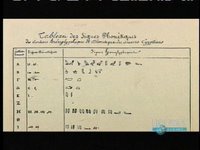Egypt Untold
 I am in Egyptology heaven due to the fact that the "Discovery Channel" is running a series called "Egypt Untold". I really can't remember when this interest in Egypt and it's history started, I do remember a childrens history book on Egyptology that I used to pour over and wonder what life must have been like then. I didn't even realize that there was a series until a second "Egypt Untold" appeared on Terry (Tivo). Last weeks was about how Howard Carter with the financial backing of Lord Carnarvon discovered the tomb of Tutankhamun. While this was interesting it was no where near as interesting as this episode about the Rosetta stone.
I am in Egyptology heaven due to the fact that the "Discovery Channel" is running a series called "Egypt Untold". I really can't remember when this interest in Egypt and it's history started, I do remember a childrens history book on Egyptology that I used to pour over and wonder what life must have been like then. I didn't even realize that there was a series until a second "Egypt Untold" appeared on Terry (Tivo). Last weeks was about how Howard Carter with the financial backing of Lord Carnarvon discovered the tomb of Tutankhamun. While this was interesting it was no where near as interesting as this episode about the Rosetta stone.Before I watched this I had only the vaguest of ideas of what the Rosetta Stone was. The Rosetta Stone was named because it was found near a town called Rosetta by soldiers of Napoloen's army who were reinforcing a fort.
 Eventually the Rosetta stone made it back to the Museum of England but not before the 160 artists and scientists in Napoleon's army were able to make numerous copies of it. Why the Rosetta stone was so important was that it had three different languages, hieroglyphs, Demotic, and Greek, written proclaiming the glory of the Pharaoh Ptolemy V. The reason that the stone had three different languages was that it was supposed to be read by anyone currently living in Egypt at that time (~196 BC). Hieroglyphs were used by the priests (they were also the defacto language for important and religious messages), Demotic was a simplified script preferred in court and in legal and business documents while Greek was the language of the Ptolemic Dynasty.
Eventually the Rosetta stone made it back to the Museum of England but not before the 160 artists and scientists in Napoleon's army were able to make numerous copies of it. Why the Rosetta stone was so important was that it had three different languages, hieroglyphs, Demotic, and Greek, written proclaiming the glory of the Pharaoh Ptolemy V. The reason that the stone had three different languages was that it was supposed to be read by anyone currently living in Egypt at that time (~196 BC). Hieroglyphs were used by the priests (they were also the defacto language for important and religious messages), Demotic was a simplified script preferred in court and in legal and business documents while Greek was the language of the Ptolemic Dynasty.How did a Greek become an egyptian Pharaoh? This happened when Alexander the Great beat the Persian army which was in control of Egypt at the time. When Alexander the Great died his Empire was split between three men and the one that gained control of the area around Egypt was a Greek named Ptolemy. The first Ptolemy governed Egypt more like a business however his successor's eventually became Pharoah's.
An interesting side note that I found out was that the name Ptolemy was passed down from Pharaoh to Pharoah as was the name Cleopatra from queen to queen. I had originally thought that the Cleopatra that lived during Julius Ceaser's and Marc Antony's time might have been the Cleopatra, I didn't realize that it was a named passed from generation to generation.
 Interest in Egypt spiked after Napoleon came back to Europe as he brought with him books and illustrations that his scientists and painters compiled during their three year campaign in Egypt. The only problem was that all the theories were based only on speculation due to the fact that no one could read hieroglyphs. Two men appeared to take up the challenge, a Frenchman by the name of Jean-Francois Champollion and an Englishman by the name of Thomas Young. Champollion was a naturally gifted linguist who by the age of 16 had already learned 12 ancient languages without any formal schooling. Thomas Young on the other hand was a independently wealthy scientist who was tapped by the British government to attempt to translate the Rosetta Stone. The reason why the British government wanted him to
Interest in Egypt spiked after Napoleon came back to Europe as he brought with him books and illustrations that his scientists and painters compiled during their three year campaign in Egypt. The only problem was that all the theories were based only on speculation due to the fact that no one could read hieroglyphs. Two men appeared to take up the challenge, a Frenchman by the name of Jean-Francois Champollion and an Englishman by the name of Thomas Young. Champollion was a naturally gifted linguist who by the age of 16 had already learned 12 ancient languages without any formal schooling. Thomas Young on the other hand was a independently wealthy scientist who was tapped by the British government to attempt to translate the Rosetta Stone. The reason why the British government wanted him to  do this was that they felt it would be an embarassment if the French were able to do it when it was the English that had the actual Rosetta stone. I don't claim to understand the historical hatred between the French and the English in the 1800's but apparently the desire to not be one upped was very important for England at the time. Thomas Young felt that hieroglyphs were not an actual spoken language but symbols where he could use the greek translation and math to attempt to translate hieroglyphs. The idea was that he was going to look for groups of symbols in the hieroglyphics that occured the same number of times that words in the Greek message appeared. Champollion took it for a linguistic perspective and felt that it was a spoken language and to do this he focused on the use of Coptic.
do this was that they felt it would be an embarassment if the French were able to do it when it was the English that had the actual Rosetta stone. I don't claim to understand the historical hatred between the French and the English in the 1800's but apparently the desire to not be one upped was very important for England at the time. Thomas Young felt that hieroglyphs were not an actual spoken language but symbols where he could use the greek translation and math to attempt to translate hieroglyphs. The idea was that he was going to look for groups of symbols in the hieroglyphics that occured the same number of times that words in the Greek message appeared. Champollion took it for a linguistic perspective and felt that it was a spoken language and to do this he focused on the use of Coptic. In the end it was Jean-Francois Champollion who translated hieroglyphs when he realized that Coptic borrowed seven symbols from Demotic and from that was able to make educated guesses on how to translate and pronounce the hieroglyphs (Coptic was a language spoken by a christian sect in Egypt around the 4th century AD and at the time there existed a Coptic church in Paris). Based on how he translated the hieroglyphics on the Rosetta stone Champollion was able to translate a copy of a cartouche found at Abu Simbel to be the Pharoah Ramses. Eventually Champollion was able to go to Egypt using funding from the King of France and while in Egypt was finally able to prove once and for all that he could translate hieroglyphs.
In the end it was Jean-Francois Champollion who translated hieroglyphs when he realized that Coptic borrowed seven symbols from Demotic and from that was able to make educated guesses on how to translate and pronounce the hieroglyphs (Coptic was a language spoken by a christian sect in Egypt around the 4th century AD and at the time there existed a Coptic church in Paris). Based on how he translated the hieroglyphics on the Rosetta stone Champollion was able to translate a copy of a cartouche found at Abu Simbel to be the Pharoah Ramses. Eventually Champollion was able to go to Egypt using funding from the King of France and while in Egypt was finally able to prove once and for all that he could translate hieroglyphs.Something that I found really interesting was that during this time Champollion was viewed as a risk to the authority of the Church. The reasoning was as such, if Champollion was able to translate something that said that Egypt was older than the date figured for the great flood (2349 BC) that it would undermine the authority of the Church and throw doubt onto the Bible. Part of the stipulation to the King of France paying for Champollion's work in Egypt was that if he found anything to disprove this belief in the date of the Great Flood he was not allowed to publish it.
Next in the series of "Egypt Untold" is going to be about Ramses, see what I mean ... Egyptology heaven.

0 Comments:
Post a Comment
<< Home